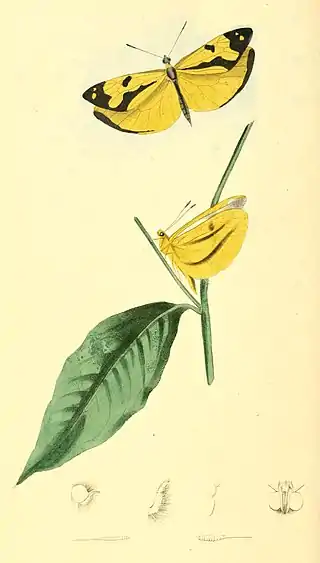
LICINIA Melite.
Generic Character.
- Antennæ graciles; clavâ elongatâ, fusiformi, compressâ. Palpi brevissimi, vix ultra caput producti, ad linguam compressi, squamis linearibus tecti, margine ciliati, articulo ultimo sub-nudo, secundo subæquali. Abdomen elongatum, gracile, in maribus 6-articulatum, articulo ultimo integro; valvis plerumque elongatis, attenuatis, apice acutis. Alæ anticæ (in maribus) angustæ, obtusè-attenuatæ, (in fœminis) latiores, obliquè rotundatæ. Alæ posticæ (in maribus) dilatatæ, longitudine anticis penè æquales; margine antico opaco, in fœminis breviores, suborbiculares.
Typus Genericus L. Melite. Nobis.
- Antennæ slender, the club elongated, fusiform, and compressed. Palpi very short, hardly projecting beyond the head, compressed on the tongue, covered with scales and margined externally with long hairs, the last joint nearly naked and almost as long as the second joint. Body elongated, slender, in the male with 6 joints, the last entire. Valves generally elongated, attenuated, their tips acutely pointed. Anterior wings (in the male) narrow, obtusely attenuated; in the female broader, and obliquely rounded. Posterior (in the male) dilated, nearly as long as the anterior wings, the fore margin opaque; in the female shorter, and nearly orbicular.
Generic Type L. Melite.
Specific Character.
- L. (Mas.) alis flavis; anteriore suprà nigrâ, fasciâ obliquâ flavâ, et lineâ, basali transversâ, margine posteriore flavo. (Fœm.) Alis suprà albis; anteriore apice stigmateque marginali obliquo nigris; posteriore suprà nigro marginatâ, subtùs (in utroque sexu) flavescente, lineis duabus transversis fuscis.
- Male. Wings yellow, anterior above black, with an oblique yellow band and transverse basal line; posterior margin yellow. Fem. Wings above white; anterior, with the tips and marginal oblique stigma black. Posterior, above margined with black; beneath (in both sexes) yellow, with two transverse brown lines.
- Papilio Melite. Fab. Ent. Syst. 160, 494. Cramer, tab. 153. C. D.
The remarkable size of the under wings in the male insects of this genus will distinguish them even to a casual observer as forming a natural group. They are all natives of South America, where I discovered nine species. The females differ most strikingly, and have hitherto been mistaken by authors not only for distinct species, but as belonging to different genera.
Their natural situation will be among the Pieridæ, with whose general habit they accord.
The female of this species resembles Pap. Licinia of Cramer, except in having a short black stigma in the middle of the anterior border of the fore wings, pointing obliquely to the exterior margin. Cramer's insect, however, is the female of another undescribed species in my cabinet.
The under side of the posterior wings in both sexes is the same.